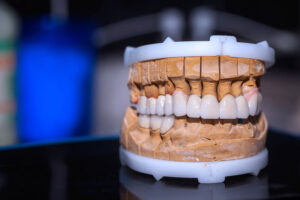
Are you one of the more than 10 million Americans affected by temporomandibular joint disorders (TMJ)? If so, you know how much these conditions can affect your quality of life, and you’ve probably spent a great deal of time and money searching for a solution. Could surgery be the answer to your problem?
Surgery isn’t necessary for most cases of TMJ, but in some situations, it may be the right option. The best way to know if you are a candidate for TMJ surgery is to schedule an evaluation with Fort Worth dentist Dr. Nikki Green. She and her skilled team will discuss your symptoms and your concerns, perform a thorough examination and evaluation, and review the treatments that you’ve already tried. We don’t jump to surgery immediately, but if you’ve tried and failed more conservative treatment options, we’ll discuss the possibility.
What Is TMJ?
TMJ refers to a number of different conditions that affect the temporomandibular joint. This is the joint just below your ear that connects your lower jaw and your skull.
This joint, like your hips or your shoulders, is designed to accommodate a wide range of motion. Think about the motions your jaw makes as you chew and speak – your jaw can go up and down, side to side, back and forth, and around in circles.
But when you have TMJ, the joint becomes compromised and inflamed, leading to pain and other problematic symptoms. Some of the symptoms that people with TMJ experience include:
- Radiating pain throughout the jaw, neck, and shoulders (and sometimes down the arms)
- Pain in the ears and tinnitus (ringing of the ears)
- Migraine headaches
- A grinding sensation in the joint
- Popping and clicking sounds and sensations from the joint
- Locking or sticking in the joint
As part of your regular dental care, Dr. Green will perform a screening for TMJ symptoms.
What Causes TMJ?
A number of situations can lead to TMJ, including arthritis and injury to the joint, but sometimes TMJ can develop without any known cause.
One of the most common scenarios that leads to TMJ is bruxism, the medical name for a condition that causes people to chronically grind and clench their teeth. This condition creates constant stress on the teeth and jaw muscles and also leads to work-down teeth, chips, and fractures. If it goes on long enough, it can even cause people to lose their teeth. Bruxism puts a great deal of stress on the temporomandibular joint, which is why when it goes untreated, TMJ can be the result.
What Other Treatments Are Available for TMJ?
Before we turn to surgery, we’ll want to know what other treatments you’ve tried. We’d always prefer to use a less invasive treatment option whenever possible. Ideally, we’ll try to determine the cause of your TMJ so that we can more precisely target your therapy.
Some of the treatments recommended for TMJ include:
- Medication – Anti-inflammatories help to relieve the pain and swelling associated with TMJ while muscle relaxants and sedatives taken at night can reduce stress on the joint.
- Oral appliance therapy – Certain types of bite guards are designed to take the pressure off the muscles, teeth, and joints to reduce inflammation and relieve stress.
- Physical therapy – Physical therapy treatments like hot and cold therapy, ultrasound, and some exercises can reduce swelling and improve the joint’s range of motion.
- Counseling – If emotional stress or anxiety are leading to bruxism, which is in turn leading to TMJ, then a counselor may be able to help you explore better ways to handle stress or manage your worries.
If these non-invasive treatments are not working or your condition is severe, we may need to explore other treatment options, such as:
- Arthrocentesis – In this procedure, a needle is inserted into the temporomandibular joint to allow us to irrigate the joint, which removes debris and reduces inflammation.
- Corticosteroid injections – Injecting corticosteroids into the joint may help treat inflammation. Other injectable medications, including Botox, are showing promise in the treatment of TMJ as well.
So What About Surgery for TMJ?
Surgery is generally considered a last resort for TMJ, but if a structural abnormality is what’s causing the problem, then it may be an option.
You’re probably familiar with the concept of a knee replacement or a hip replacement; the joint gets worn out and damaged and is then replaced with an artificial joint. The same can be done for your temporomandibular joint.
Another situation where surgery might be the right solution is if jaw misalignment is leading to clenching and grinding, which is then contributing to TMJ. In this case, surgery to correct the misalignment can help treat the bruxism, thereby also treating the TMJ. Poorly aligned molars or wisdom teeth can also contribute to this problem, and extracting those teeth can help.
Call to Schedule Your Consultation
We’d love to see you here at Fort Worth Cosmetic and Family Dentistry to see how we can best help you. To schedule your evaluation and consultation with Dr. Nikki Green, please call our office today at (817) 737-6601!



